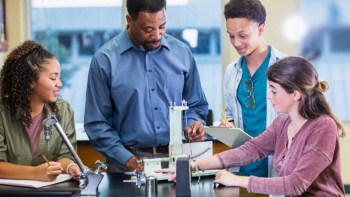Born in Iran, Taghi Amirani went to school in the UK before studying physics at the University of Nottingham. He later moved into TV and is now a documentary film-maker based in London. His most recent project was Coup 53, which recounts the 1953 coup in Iran orchestrated by the British and American secret services that overthrew prime minister Mohammad Mosaddegh in the quest to control the country’s oil.

What skills do you use every day in your job?
Physics and film-making have been intertwined throughout my career since I was an undergraduate. In 1984 I made the unusual suggestion to the physics department at the University of Nottingham that my final-year project should be a film instead of a lab project. Rather than conduct a physics experiment that needed writing up, I would make a documentary about black holes.
After weeks of back-and-forth and negotiations that went all the way up to the heads of the science faculty, the Nottingham physicists displayed remarkable open-mindedness and agreed. Shades of Black became my first film and launched 38 years of film-making adventures. Every skill I developed in making that project a reality, I use to this day.
Taking a leap of faith into the unknown, honing persuasive powers to attract funders and collaborators, hard-nosed and persistent research, perseverance in the face of obstacles and trusting my instincts are some of the skills that have helped me. All of these culminated in my latest film, a theatrical feature called Coup 53. Every scientific endeavour requires an analytical mind driven by intense curiosity. So does documentary-making. Shades of Black was about going back in time to uncover the secrets of the universe. Coup 53, the story of the 1953 MI6/CIA coup in Iran, is about uncovering dark secrets buried deep in history.
What do you like the best and least about your job?
What I like best about being a documentary maker is that I can pick a subject I am curious about and take a deep dive into it until I find a compelling story worth telling. The serendipity of unexpected connections and revelations is pure joy when combined with artistic expression to tell a story that is personally meaningful and resonates with a wide audience. You take what seems like a personal obsession, turn it into a film that requires an army of collaborators to bring it to fruition, and then stand at the back of a cinema and watch it grip and move total strangers gathered in the dark. That human connection is precious beyond words.
For the duration of a production, you become so immersed and absorbed in a new subject that you can almost pass as an expert, albeit in a small sub-section. The learning never stops. This was particularly true in making Coup 53, for which I was privileged to work with the legendary Walter Murch (Apocalypse Now, The Godfather, The English Patient). It was physics that brought us together. Walter was editing Particle Fever – a documentary about the discovery of the Higgs boson, when we met in New York in 2012. Bonding over physics and film-making, I never imagined that I would end up working with Walter on the most important film of my life. He has not only made me a better filmmaker, but our collaboration made me a better human being. This is the kind of experience that transforms a job into a calling.
What I like least about my job is that I love it so much that I occasionally work for no pay. This is a habit I am working hard to break.
What do you know today that you wish you knew when you were starting out in your career?
Uncertainty is good. Having a five-year plan or a 10-year plan is pointless if you’re a creative soul. Don’t worry about having a career. Find what you love and keep on doing it. Trust your process and go with the flow because things will almost always work out. Embrace your mistakes. Take more risks. Sometimes not getting what you want is the best thing that can happen to you.


